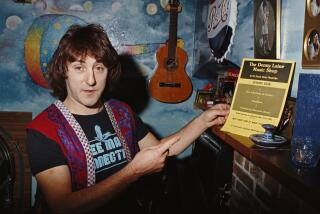DIALOGUES IN SWING <i> by Fred Hall (Pathfinder Publishing, 458 Dorothy Ave., Ventura, Calif. 93003: $18.95, cloth; $12.95, paper; 223 pp.) </i>
- Share via
This collection of interviews adapted from Fred Hall’s syndicated radio show, “Swing Thing,” functions as an oral history of the golden age of swing. Read one after another, the pieces give a sense of the interconnectedness of this small world, as all the performers refer to each other’s work. The subjects are Bob Crosby, Dick Haymes, Jo Stafford and Paul Weston, Woody Herman, Mel Torme, George Shearing, Wild Bill Davison, Peggy Lee, Artie Shaw, Jimmy Van Heusen and Maxene Andrews. A final chapter is a compilation of comments from people who worked with Glenn Miller, whom, the author laments, “I was not lucky enough to have interviewed.”
Hall clearly is interested in career beginnings and the definition of individual styles. Maxene Andrews says of the early days of the Andrews Sisters with the Ted Mack band: “The only thing that the Andrews Sisters could copy from the Boswell Sisters were their arrangements, because we sang loud and we moved a lot. Harmony groups never moved, but we never could contain ourselves. When we heard music, we had to bounce with the time. . . . I used to sit on the bandstand and I would listen to the three trumpets, and I would say to my sisters: ‘That’s the way we should sing, like those three trumpets sound.’ ”
Money is an inevitable subject (many of the performers can remember exactly what they were paid for gigs decades ago) and the constant lack of it must account in part for the bitterness sometimes expressed about later popular music. Of the golden years 1937-1941, Hall says: “American popular music reached its peak in terms of quality and musical invention. The active word here is ‘popular.’ The listeners and the creators of music were at a common level and what was good was what was ‘commercial.’ Considering the pathetic state of affairs today, I know that’s hard to believe.”
And Dick Haymes on the subject of fame proves that fans didn’t wait until rock ‘n’ roll to faint in ecstasies, although they may have done it in greater numbers and to greater effect on the stars’ hat sizes: “It embarrassed me . . . it wasn’t the return of Jesus, you know, it was just a boy singer that all the teen-agers wanted to tear his clothes off, that’s all. . . . There was no possible way, when I played the Roxy, of performing a song all the way through and being listened to. One little turn of phrase and everybody would sigh or yell or scream and, you know, there was just total pandemonium all the time so there was really no art to it then.”
More to Read
Sign up for our Book Club newsletter
Get the latest news, events and more from the Los Angeles Times Book Club, and help us get L.A. reading and talking.
You may occasionally receive promotional content from the Los Angeles Times.









